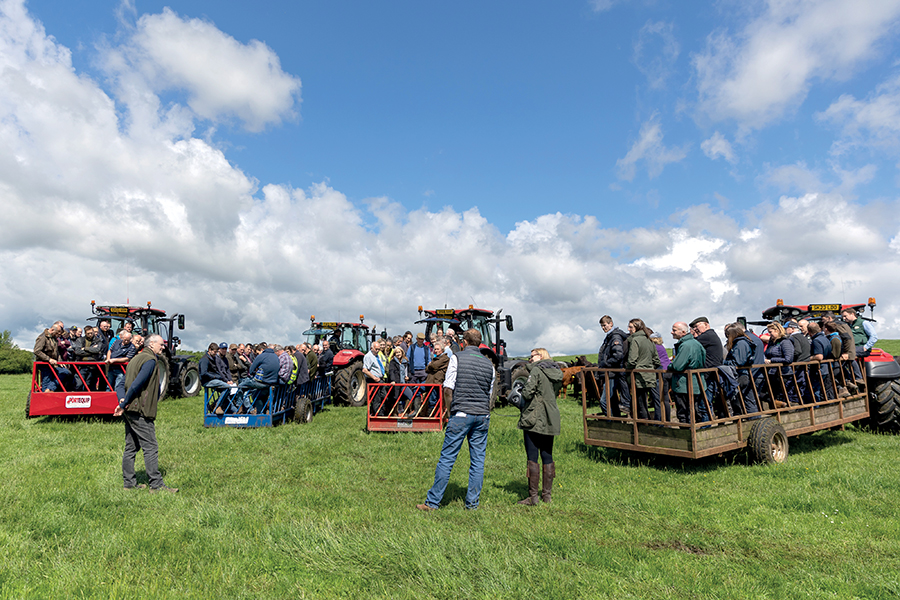Beef experts share practical advice for a changing world
30th July 2024
A series of recent roadshows in Scotland discussed the challenges facing beef farmers and how to overcome them.

Our climate is changing, policy is changing and our beef industry is changing, said SAC Consulting beef specialist, Sarah Balfour, during the recent Big Beef Roadshows across Scotland.
The events, which were attended by over 400 farmers, saw industry experts share practical advice on nutrition, bull fertility, current market trends and EID.
Speaking to Farmers Guide, Sarah noted that beef farmers are facing a variety of challenges, not least the changing climate. Winters are getting longer and springs and summers are getting wetter – reports suggest straw is likely to be relatively scarce in certain areas this year, as record-breaking wet weather delayed spring field work.
Input costs also continue to be a challenge, while the finished beef price currently sitting low is squeezing margins, and making budgeting and forward planning difficult. The industry needs a system in place to prevent the beef price dropping below a certain level, Sarah believes.
The lack of clarity on government policy going forward is another concern. “Farming is a business like any other, so there needs to be a steady cashflow, there needs to be forecasting and budgeting. All that becomes quite difficult when there’s so many factors that affect farmers’ businesses which are outside their control,” she added.
There is a worrying downward trend in the number of suckler cows in both Scotland and the UK as a whole, with lots of cattle being dispersed – despite the price of store cattle being the strongest it’s been for some time. “One of the main reasons for this is the lack of available labour on farms,” Sarah noted.
“Although many suckler farmers have taken advantage of strong cull cow prices to cull out underperforming cows, lack of labour is one of the reasons contributing to herd dispersals currently.”
However, despite this, there was plenty of positivity among farmers at the roadshows. After a long, wet spring and delayed turnout, the meetings were a welcome opportunity for farmers to get together and have a chat – and learn that other farmers are facing the same problems they are, Sarah said.
Key take home messages
“One of the themes that was discussed at the events was not necessarily making big changes, but more fine-tuning and adapting your current farming practices and business to improve efficiency. The smaller changes add up to make the big changes,” Sarah commented.
Becoming less reliant on labour is important, and one way to do this is selecting the right breed for your system and what you want to achieve. Each of the host farms for the roadshows had very different systems and different breeds, “but they all work”.
“For upland hill farmers, it’s about making best use of hill ground and being able to outwinter with the hardier native breeds if possible. It’s really about adapting systems to suit your farming environment. That goes hand in hand with reducing labour.”
Improving suckler herd fertility was also highlighted as a key way to improve cow margins and therefore business profitability. Sarah stresses the importance of routinely fertility testing stock bulls – as a three-year trial run by SRUC vets found on average one in five bulls fail a fertility test irrespective of age or breed – in order to avoid the hidden costs such as reduced weaning weights.
“It’s an area of interest for me. Those herds which are performing well are those with high levels of fertility. Improving performance within a beef herd relies on optimal fertility,” Sarah advised.
Additionally, getting the basics right with nutrition is important, ensuring the energy, protein and fibre are right as a starting point. Rationing is a guide, but it needs to be looked at and adapted, based on daily liveweight gain performance. Many attendees also stressed the value of creep feeding calves, as younger calves are more efficient at converting feed to kilos of liveweight gain.
Sarah concluded: “Going forward the more self-sufficient a farm is, the more resilient it is. The roadshow meetings highlighted that it’s not about one system being better than another, it’s about maximising your own system.”
The roadshows, funded by the Universities Innovation Fund, were held at Corskie Farm, Garmouth, Hilton of Beath Farm, Kelty and Knockenjig Farm, Sanquhar. They were brought to fruition by Sarah, and her nutritionist colleagues in the livestock team at SAC Consulting, Lorna Shaw and Karen Stewart.
Read more livestock news
